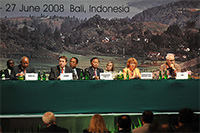United Nations Waste Treaty Postpones Long Awaited Toxic Waste Dumping Ban
BAN Press Release
 |
 |
 |
 |
| |
 |
|
| |
9th Meeting of the Conference of the Parties to the Basel Convention, in Bali, Indonesia.
©2007, IISD.
|
|
 |
 |
 |
|
| |
27 June 2008 (Bali, Indonesia.) – The week-long 9th Meeting of the Conference of the Parties to the Basel Convention ended today with little progress in breaking the deadlock that is preventing a global toxic waste dumping ban from entering the force of international law. An effort promoted by Japan, Canada, New Zealand and India to require the amendment to gather 128 ratifications, instead of 62 of those that agreed to it in 1995, met a vigorous rejection led by many African and Arab countries that seek the earliest entry into force possible.
The ban was adopted as a proposed amendment to the Basel Convention in 1995 and was a goal of the developing countries since the beginning of the Convention. It has now received 63 ratifications but not all of these qualify to enter it into force as they were not present at the time of its adoption.
"It has been 13 years since the global community passed the Basel ban to end the export of toxic wastes from wealthy countries to developing countries. It is immoral to wait even one more day to secure its entry into force," said Kevin Stairs of the Basel Action Network (BAN). "Developing countries suffer enough from the ravages of hunger, poverty, infant mortality, and disease. Sending them our toxic waste, amounts to a cruel throwing of salt in the wounds, undertaken simply to increase profits at the expense of developing countries, their people and the global environment."
In response to the failure to agree on the number of Parties it takes to enter the ban into force, the Indonesian Presidency proposed a "Way Forward" paper which was adopted by the meeting. It called on Parties to expedite ratification of the Ban Amendment so as to facilitate its entry into force and further called on Parties to create enabling conditions to achieve the objectives of the Amendment in the interim period.
"The Indonesian government has the best of intentions, but unfortunately, one can not wave a magic wand and expect that Japan, the US and Canada will suddenly stop trying to undermine the ban. That is doubtful," said Jim Puckett of BAN. "But hopefully this new statement, will lead to many more ratifications that will provide momentum to break the deadlock and achieve entry into force at the next meeting in 2011."
The export of hazardous wastes, particularly post-consumer waste in the form of electronic waste and old ships has actually increased in recent years. BAN announced at the meeting that a recent visit to Guiyu, China showed that the primitive processing of electronic wastes illegally imported from countries such as USA, Canada and Japan such as open burning of components and wires, cooking of circuit boards and primitive, acid stripping of microchips to extract gold, had gotten far more extensive in the last six years.
"How is it possible that six years after having exposed this illegal global toxic waste dumping ground, the Basel Convention Parties have not taken their responsibility to put an end to this disaster?" said Jim Puckett. "The Convention risks becoming a paper tiger if it's Parties cannot implement and enforce its own rules."
BAN expressed satisfaction that the Convention also showed concern that the new treaty designed to ensure safe recycling of ships being negotiated at the International Maritime Organization, may not provide an equivalent level of control when taking into account the principles of the Basel Convention and will be conducting an assessment of it. Little has changed to improve the horrible situation found on the shipbreaking beaches of Bangladesh, India, and Pakistan where workers are killed by explosions, crushing accidents, but also are subjected to deadly toxic materials on the ships such as asbestos, PCBs, and heavy metals. Just this month 4 workers were killed in accidents on Chittagong, Bangladesh. The Parties to the Basel Convention will be conducting an assessment of the IMO Convention.
"The IMO Convention is unfortunately drafted by and for the shipping industry. It represents a giant step backwards for international principle and law," said Jim Puckett. "It does nothing to ensure that ships are recycled to meet any international minimum standard; it does not ensure that they are first cleaned of hazardous substances such as asbestos before being exported; and it fails also to ensure that ships are built with less hazardous substances in future."
Contact:
Jim Puckett of BAN at 9th Conference of Parties in Bali from 23-28 June.
(206) 652-5555 (Seattle). Melia Bali Hotel: (62) 361-771510, Room 2229, jpuckett@ban.org
Kevin Stairs of BAN, +49.6221.809.941, (cell) +49.179.928.2037.
FAIR USE NOTICE. This document contains copyrighted material whose use has not been specifically authorized by the copyright owner. The Basel Action Network is making this article available in our efforts to advance understanding of ecological sustainability and environmental justice issues. We believe that this constitutes a 'fair use' of the copyrighted material as provided for in section 107 of the US Copyright Law. If you wish to use this copyrighted material for purposes of your own that go beyond 'fair use', you must obtain permission from the copyright owner.
More News
|
 |